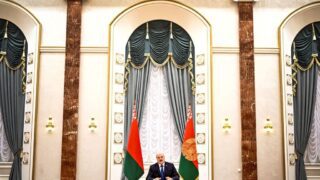Why Belarus failed their refugee hybrid attack
Video Summary
In 2021, Belarus’s leader Alexander Lukashenko began smuggling migrants from the Middle East and Afghanistan to his neighboring countries, Poland, Lithuania, and Latvia. He did so to pressure the EU, which had imposed restrictions on Belarus after his disputed 2020 presidential election. Lukashenko wanted these sanctions lifted and was willing to stop the migrant flow if paid. The situation is an example of a hybrid war, with the borders between transparency and confusion. Lukashenko wanted to create a transparent attack, making sure the EU knew he was behind the migrant influx, and thus creating a bargaining chip. However, the operation failed. The EU did not fall for the trick, and instead, imposed more sanctions on Belarus. The operation was a mistake from the start, as Lukashenko underestimated the EU’s resolve and the effectiveness of Poland, Lithuania, and Latvia’s quick response to shut down the border. The case shows how hybrid wars can be handled and how to respond to hybrid attacks, such as escalating one’s way out of ambiguity and taking decisive action.
























